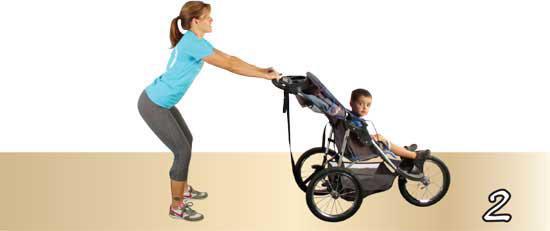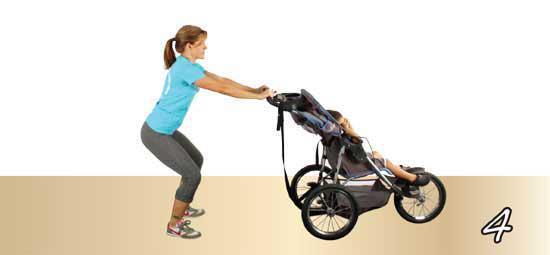Everyday Paleo (56 page)
Authors: Sarah Fragoso
Tags: #Diets, #Healthy Living, #Health & Fitness, #General

MUSCLES USED: Abdominals, Iliopsoas, Latissimus Dorsi, and Pectoralis

1)
Jaden starts in the same position as the jumping pull-up.
2)
Squeezing his tummy muscles, Jaden lifts his knees up toward his chest.
3)
Jaden continues to use his tummy muscles to touch his knees to his elbows. Have your child simply raise his or her knees up as much as he or she can. If that means only raising his or her knees up a few inches, that is just fine. We all have to start somewhere!
4)
Jaden drops his feet to the floor, returning to the start position.
Family Fitness

T
his section focuses on movements that you can do with either a baby or toddler. After learning these movements, feel free to use them to replace the movements in the beginner workouts or advanced beginner workouts laid out earlier in the book. I know how hard it can be to find the time to exercise when you have a baby or a toddler, but the truth is that when you set aside even a few minutes during the day, or a couple of hours a week, especially if using a cross-training method, it will garner you results! And when you add a Paleo diet to this regimen, you will not only see visible improvement, but your overall physical and mental health will benefit almost immediately.
I know from experience how cooped up one can feel with a baby or toddler at home, but feeling trapped is another choice that we often end up making. We end up feeling bogged down and unable to do anything other than the endless laundry, dishes, diapers, feeding, and meal planning. Unless we take time out to exercise, we will continue to come up with a million excuses not to. The truth is, before you can say, “I hate being out of shape,” your little baby will be fifteen years old and you will wonder why you worried so much about having clean sheets and a spotless sink. So my advice is, let go a little bit, grab your baby or toddler, strap him or her into the stroller, and take a walk!
While you are walking, look around you—take a few deep breaths of air, let it out, and feel your shoulders relax. Let go of all the silly stuff that made you so tense in the first place. Smile at people as you walk by them, notice detail—how the leaves look on the trees, if birds are singing, and what the rhythm of your footsteps sound like. In other words, just be.
Another great way to exercise with your baby is to wear your baby! Purchase a Moby Wrap (www.mobywrap.com) or another form of a sling or baby carrier and strap the little guy or girl close to you. You’ll enjoy the up-close and personal time with your little one, you’ll be able to get more done around the house and with your other kids, and you’ll be getting a workout in without even thinking about it. Rowan lived in a Moby Wrap for the first year of his life happily snuggled up to me, watching everything we were doing together or snoozing away in his little nest on Mommy. I even figured out how to nurse him while he was in there. He was happy and content most of the time, and I was more productive and able to spend more time with the older boys.
Some of the movements that I show you in this section incorporate holding a toddler, but if you feel stable and strong enough, you can do these movements while wearing a baby in a wrap or sling as well! So, let’s get started with a few of the basic movements that you can easily do while baby is in the stroller.
Stroller Squat
The squat is one of the best exercises that you can do to help strengthen the legs, glutes, hamstrings, and core. Especially after having children, women often struggle with core strength. By incorporating this movement into your workout routine, you can quickly regain any lost strength and get back to pre-baby shape or even better—especially when eating a healthy Paleo diet!
MUSCLES USED: Quadriceps, Gluteals, and Hamstrings

Stand directly behind your stroller, grab the handles tight for balance and support. Just as when performing the traditional squat, you want your feet under your shoulders, your tummy and legs tight, and your back straight.

As you push your fanny back, push the stroller out in front of you until your arms are fully extended

Sink your fanny back and down while maintaining a tight hold on the stroller handle. Maintain that tight tummy and straight back. The goal is to lower your hips below your knees, but if that does not feel safe or comfortable, just go as far as you can. Make sure to always keep the weight in your heels and do not let your knees track forward over your toes.

Push through your heels as you begin to rise back up to a standing position. Keep your arms extended and holding on to the stroller for balance.

Return to a full upright position.
Stroller Sit-Up
Instead of using your baby or toddler as an excuse not to exercise, I challenge you to consider your little person a perfect excuse
to
exercise. Your little guy or girl loves to be with you, loves to see you happy and energized, and really doesn’t care what the heck you are doing, as long as you are doing something together. Every baby loves a game of peekaboo, and the stroller sit-up can be just that. If you are not at home, you can easily stash a yoga mat or towel in your stroller and while at the park, pull off to the side, and add some sit-ups to your stroller routine!
MUSCLES USED: Abdominals, Gluteals, Quadriceps, and Hamstrings

Lay down directly in front of your stroller with your knees bent and your feet next to the front wheels; make sure you set the brakes on your stroller! Raise your arms overhead and then place them flat on the ground above you.

Swing your arms forward to generate the momentum needed to sit up. Instead of trying to crunch your head toward your knees, move your chest toward your knees.

